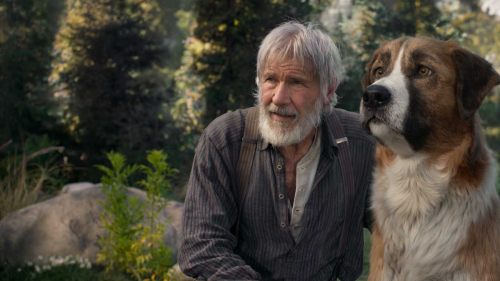Fantastic Fest Review: APOSTLE Is Gareth Evans’ Gnarly Return To Horror
Between Jeremy Saulnier's Hold the Dark and Gareth Evans' Apostle, Netflix is taking a slight gamble by giving young, independent genre auteurs a sizable amount of money to make movies that are big, ambitious, and (perhaps most importantly) weird. On one hand, this is great news. The streaming giant’s investment in this diverse brand of content means they're enabling a new set of artists to execute their more idiosyncratic whims, enriching a cinematic ecosystem that might not have otherwise been fed via traditional studio funding. On the other, you wish most audience members would be able to witness their works on the big screen instead of from their couch, as just because the distribution format is different, that doesn't mean these artists adjust their frames accordingly.
This is all a long-winded means of thanking God (or whatever deity is out there) for film festivals, especially cinematic celebrations such as Fantastic Fest. Though the majority’s overall viewing habits may have changed, there's still an added value to seeing films owning such scope projected bright, big, and in a dark room among strangers. That environment greatly benefits a picture such as Apostle, which finds Evans expanding upon motifs he discovered with the V/H/S 2 segment he co-directed with his sibling in cinema Timo Tjahjanto ("Safe Haven"). Only the Welsh filmmaker's striving script and patient direction imbue this new story of clandestine, nefarious worship with a sense of pastoral horror, ostensibly borrowed in equal measure from the UK mavericks of the '70s (think: Britain’s undervalued Tigon Studios), and Books of Blood era Clive Barker.
1905. Thomas Richardson (Dan Stevens, barely leaving his Legion twitchiness behind) has been recruited to rescue his sister, Jennifer (Elen Rhys), who’s been abducted by the followers of Prophet Malcolm (a blustery Michael Sheen). Together with his refugee "brothers" in prayer, Quinn (Mark Lewis Jones) and Charles (Richard Elfyn), who kneel before a "Goddess" they speak of with the highest reverence, the preacher built a somewhat communist island paradise, where these burly, weathered men (along with the sons they father) put in a day's work for a day's bread. Material possessions from the mainland are outlawed, as no member is defined by what they own. All are equal, and the laws for living are outlined in Malcolm's red covered, self-penned Bible. Those uninterested in obeying are marked blasphemers and cleansed appropriately.
A clever con man hooked on laudanum, Richardson lets this search become his own means for atonement, though it may not be in the Lord's eyes. A former missionary who's seen and bears the scars of suffering his God not only demands, but seems to thrive on, Richardson is a man with no need for another wild-eyed preacher. They’re all extolling the virtues of fascistic despair, keeping their flock in order under the threat of harm. Admittedly, these are stoned, sophomore dorm-level pontifications on the pitfalls of spiritual conviction, but Evans sells this snake oil with a rather propulsive, adventurous tone, painting Thomas' journey with broad, gorgeous strokes, aided by the wide lenses of his consummate cinematographer Matt Flannery (The Raid duology).
Aiding his director in no small way is Stevens, who is possessed by an unwashed mania that instantly draws us into Richardson's voyage. So, when he croaks how the "promise of the divine" is but a lie to Malcolm's daughter Angela (Lucy Boynton) we believe him wholeheartedly. Almost every character in Apostle has been banished or broken by the world in one way or another, and the crops have begun to die off in this foreign green land, leading Malcolm and his co-founders to seek out more brutal means of stoking their hidden (and possibly also kidnapped) Goddess' good favor. Once Thomas lays eyes on the ghastly practices and apprentices that these men of faith employ in their mission, Stevens can convey his character's descent into full-blown obsession. He must beat these new demons, the likes of which cannot be forgotten by copious opiate abuse.
Matching his leader's overall immensity is Michael Sheen, who is acting from his gut in Apostle. A late in the game power struggle that develops between Malcolm and Quinn gives it that extra push over the finish line. Stepping up to his opponent at every turn (and possibly even besting Sheen) is Mark Jones, who delivers the meaty villain this type of movie needs. He's the barroom brawler iteration of Vincent Price's Matthew Hopkins (in Witchfinder General), spitting threats at all he comes across, mad with a desire to be this community's conquering hero. It's a glorious bit of hambone wickedness.
Though there's a learned discipline on display in Evans’ craft, he hasn't left his love of tactile violence behind in Indonesia (where the director helped bring Silat to a higher level of awareness for martial arts fans the world over). The climax of Apostle is riddled with bruising fisticuffs, where Evans' camera comes alive, watching as men are slugged, pounded and perforated, continuing to find colorfully gnarly ways to mangle the human body. It's as if the action director who resides in his belly couldn't help himself, wanting to do nothing more than come out in play in this new arena the budding auteur has built. When combined with Evans' rather astute knack for creeping horror, Apostle becomes one hell of a visual feast, punishing yet rewarding its audience in equal measure.
That's not to say the picture is perfect. Apostle is slightly overlong – as a necessary but protracted subplot regarding a teenage pregnancy takes too long to end exactly how you think it will – and the filmic bombast often borders on becoming its own form of assault (though points to Aria Prayogi and Fajar Yuskemal's dynamic score for always keeping that beat down interesting). Nevertheless, these seem like rather indignant gripes when viewed in context of the movie's otherwise unlikely existence. Evans is being gifted the opportunity to truly flex here, and there were bound to be minor growing pains during that process. The whole of Apostle is so thoroughly realized (and distinctly belongs to its director) that these flaws pale in comparison to the picture’s impressive thunder, which out and out demands you give it your full attention, no matter what size screen you watch it on.



